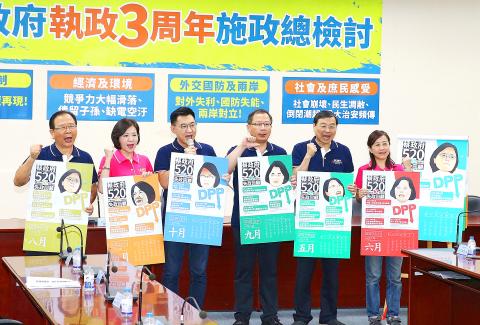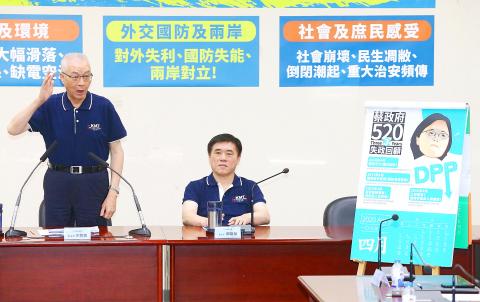President Tsai Ing-wen’s (蔡英文) policies over the past three years have been ineffective and unbalanced, resulting in dwindling economic growth and a loss of diplomatic allies, the Chinese Nationalist Party (KMT) said yesterday.
The KMT and its National Policy Foundation think tank held a news conference at the party’s headquarters in Taipei to evaluate Tsai’s performance just as an event was held at the Presidential Office to mark the third anniversary of Tsai’s inauguration.
As the ruling party, the Democratic Progressive Party (DPP) “constantly seeks to oppose [other parties] and lacks a balanced policy structure,” foundation chief executive officer Kao Yuang-kuang (高永光) said.

Photo: CNA
Those shortcomings, combined with the DPP’s “weak execution and double standards,” have led to few accomplishments and increased social disturbance over the past three years, he said.
Tsai’s “failed policies” range from legislation, the economy, the environment and foreign affairs to cross-strait affairs and national defense, Kao said.
For example, the nation’s average economic growth rate has declined from 2.83 percent during former president Ma Ying-jeou’s (馬英九) eight years in office to 2.4 percent from 2016 to last year, he added.

Photo: CNA
While Ma had signed three free-trade agreements, including the Economic Cooperation Framework Agreement with China, Tsai has so far signed only two, with Paraguay and Eswatini, Kao said.
“The trade volume between [the two countries] and Taiwan is extremely low and made almost no contribution to the national economy,” he added.
Furthermore, the Tsai administration has lost five diplomatic allies in three years, while Ma lost only one in eight years, Kao said.
KMT caucus whip Johnny Chiang (江啟臣) said that the KMT has created a calendar that lists Tsai’s “failed policies” and features a countdown to her last day in office.
The listed policies and issues include last year’s pension reforms for military personnel, civil servants and public-school teachers, alleged voting irregularities at the Nov. 24 elections, labor law amendments and the loss of diplomatic allies, he said.
KMT Chairman Wu Den-yih (吳敦義) said statistics show that as the ruling party, the KMT outperformed the DPP in economic issues and foreign affairs.
He urged Tsai to make improvements in the remaining months leading up to the Jan. 11 presidential election, adding: “If she cannot, we will be voted back to power.”
Meanwhile, Kaohsiung Mayor Han Kuo-yu (韓國瑜) told reporters during a recess at the Kaohsiung City Council that the Tsai administration “has done a terrible job over the past three years.”
Under Tsai’s administration, cross-strait relations have become tense and complaints about the government can be heard from all sectors of society, he said.
A president must work to ensure that people have better lives and if they cannot, their poll results would be low, he said.
Hon Hai Precision Industry Co chairman Terry Gou (郭台銘) also criticized Tsai, saying that her re-election would be “unfortunate” for Taiwan.
Tsai told the event at the Presidential Office that many have been saying bad things about her, Gou said.
However, the truth is “someone is doing bad things to Taiwan and that person is leading the nation right now,” Gou told reporters during a visit to puppet show studio Pili International Multimedia Co in Yunlin County.

Taiwanese can file complaints with the Tourism Administration to report travel agencies if their activities caused termination of a person’s citizenship, Mainland Affairs Council Minister Chiu Chui-cheng (邱垂正) said yesterday, after a podcaster highlighted a case in which a person’s citizenship was canceled for receiving a single-use Chinese passport to enter Russia. The council is aware of incidents in which people who signed up through Chinese travel agencies for tours of Russia were told they could obtain Russian visas and fast-track border clearance, Chiu told reporters on the sidelines of an event in Taipei. However, the travel agencies actually applied

New measures aimed at making Taiwan more attractive to foreign professionals came into effect this month, the National Development Council said yesterday. Among the changes, international students at Taiwanese universities would be able to work in Taiwan without a work permit in the two years after they graduate, explainer materials provided by the council said. In addition, foreign nationals who graduated from one of the world’s top 200 universities within the past five years can also apply for a two-year open work permit. Previously, those graduates would have needed to apply for a work permit using point-based criteria or have a Taiwanese company

The Shilin District Prosecutors’ Office yesterday indicted two Taiwanese and issued a wanted notice for Pete Liu (劉作虎), founder of Shenzhen-based smartphone manufacturer OnePlus Technology Co (萬普拉斯科技), for allegedly contravening the Act Governing Relations Between the People of the Taiwan Area and the Mainland Area (臺灣地區與大陸地區人民關係條例) by poaching 70 engineers in Taiwan. Liu allegedly traveled to Taiwan at the end of 2014 and met with a Taiwanese man surnamed Lin (林) to discuss establishing a mobile software research and development (R&D) team in Taiwan, prosecutors said. Without approval from the government, Lin, following Liu’s instructions, recruited more than 70 software

Taiwanese singer Jay Chou (周杰倫) plans to take to the courts of the Australian Open for the first time as a competitor in the high-stakes 1 Point Slam. The Australian Open yesterday afternoon announced the news on its official Instagram account, welcoming Chou — who celebrates his 47th birthday on Sunday — to the star-studded lineup of the tournament’s signature warm-up event. “From being the King of Mandarin Pop filling stadiums with his music to being Kato from The Green Hornet and now shifting focus to being a dedicated tennis player — welcome @jaychou to the 1 Point Slam and #AusOpen,” the